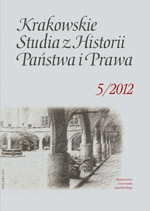Libertas scribendi – libertas lhilosophandi. Some remarks on the method of research in the field of legal history in relation to a book...
Libertas scribendi – libertas lhilosophandi. Some remarks on the method of research in the field of legal history in relation to a book...
Author(s): Paulina Święcicka Subject(s): Law, Constitution, Jurisprudence
Published by: Wydawnictwo Uniwersytetu Jagiellońskiego
Keywords: methodology; the Polish Brethren; human rights
Summary/Abstract: Libertas Scribendi – Libertas Philosophandi. Some Remarks On The Method Of Research In The Field Of Legal History In Relation To A Book By Jerzy Kolarzowski Idea praw jednostki w pismach Braci Polskich. U narodzin nowożytnej noncepcji praw człowieka [The Idea of Individual Rights in the Writings of the Polish Brethren. Birth of the Concept of Human Rights] In discussion in which there participate almost all intellectuals (including the lawyers) who deal with broadly understood social sciences, the sintagma of human rights has been detectable for centuries. Its understanding however has been and still is ideologically conditioned. The present paper was inspired by Jerzy Kolarzewski’s monograph on Idea praw jednostki w pismach Braci Polskich. U narodzin nowożytniej koncepcji praw człowieka (The idea of rights of an individual as depicted in the papers of Polish Brethren. The genesis of modern concept of human rights) Warszawa 2009. The present contribution, apart from presenting the aforementioned study, tries to make a general reflection on the method of conducting legal history research by those who are engaged in seeking the links of “genetic” characters between the legal history phenomena and the phenomena of contemporary law. In other words the researchers that come into play are those who try to arrive at the moments of “concepts” of contemporary legal concepts, as set in history. These researchers try to juxtapose them upon the “genetic principle”.
Journal: Krakowskie Studia z Historii Państwa i Prawa
- Issue Year: 5/2012
- Issue No: 1
- Page Range: 67-83
- Page Count: 18
- Language: English

